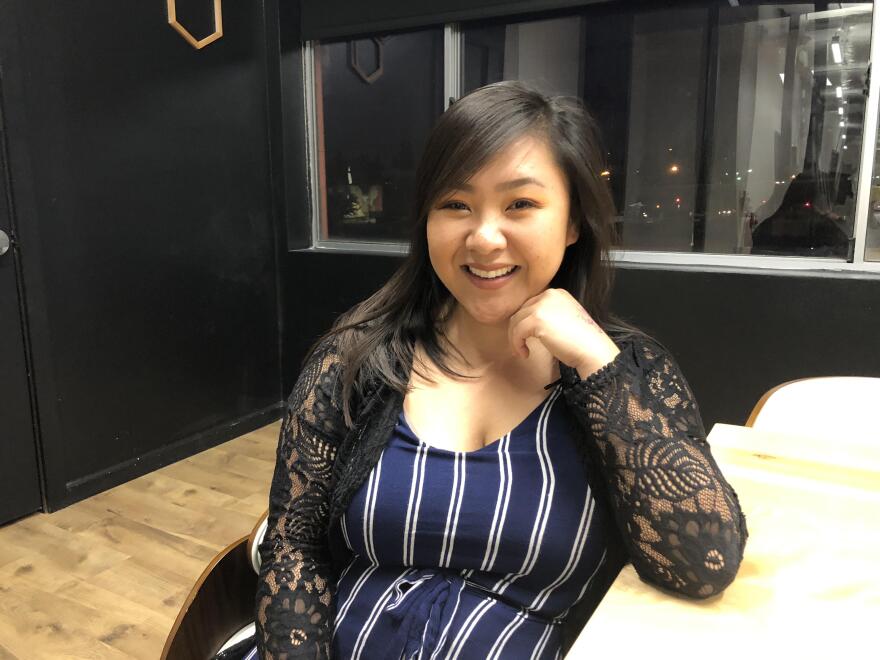To get the “I Voted” sticker, you have to understand how the voting process works. And for some refugees in the Valley, it can seem really complicated. Take the Hmong community: Many of the elders fought for the U.S. in the CIA’s secret war in Laos. When they resettled in areas like Fresno, they lacked the tools to become civically engaged. But their kids and grandkids grew up here and now, a group of them are working hard to make sure their elders cast their ballots. To do that, they’re transporting voters and translating propositions.
In the week leading up to the election, though, callers with Hmong Innovating Politics, or HIP, spoke to voters in Hmong, Lao and English. They’ve spent weeks contacting Fresno’s Southeast Asian American community to see if voters need any assistance.

“The work that we’re doing is important because we speak the language that they do,” says Kathy Vue, who works part-time with HIP. ”There’s a lot of trust when somebody who, you know, speaks Hmong calls them.”
Vue, who’s 30 years old, says language skills are helpful, but sometimes things get lost in translation. She recalls trying to help her parents vote in a past election.
“It was hard to do, because how do you translate ‘infrastructure,’ ‘proposition,’” she says. “There’s things that are in the English vocabulary that we really just cannot translate into Hmong.”
Another struggle for the Hmong community has been racism, and finding common ground between American and Hmong culture.
Andy Vang, who’s 22 years old, says that the Hmong community has internalized a lot of hate and dislike.
“There's this saying that like, if the Hmong don't love the Hmong, then who's going to love the Hmong people.”
Vang says that, growing up in Fresno, he wanted to distance himself from Hmong culture.
“I think, growing up it was a lot of self-hate within, within like your own culture kind of a thing,” says Vang. “Like you want to do something else, something that your parents didn’t do or somethin that your Hmong friends aren’t doing.”

He says that started to change once he went away for college. He missed his family, the food they ate, and the language. He became friends with other Hmong students and thought about how he could help the Hmong community back in Fresno. Today, he works part-time with HIP, doing voter outreach.
But he also wants people to fully understand the issues on the ballot.
“Because I think my opinion does not reflect their opinion and I don't want that to, like, skew, like the votes, cause every vote is really important,” says Vang. “I want them to have agency in having their own research and their own thoughts on it too.”
Mai Thao is the Civic Engagement Director for HIP. She’s spent the last couple of weeks trying to explain what’s on the ballot to Hmong elders.
“If you do fit that profile as a Hmong grandma, who's monolingual, who’s probably a little bit older, you, one, of course don't have the language skills or capacity,” says Thao. English skills means that one could call the County Elections office if they have any questions about their registration status, or explain any problems they might have. “And then two, you probably don't have an email account or you're probably not just a user in internet.” Internet access means someone could check their voter status, or look up information about their ballot.
“And so the first barrier is really just understanding, what are your rights or what are the options.”
Thao met one Hmong elder, or Hmong grandma as she calls her, at the County Elections needed to get a new ballot. The County Election Office can take care of voter registration and ballot issues on site, but Thao says that not knowing English can be intimidating. That’s why she met the Hmong grandma there, to help translate.
Thao says that Hmong Innovating Politics is trying to build trust and connections in a very specific demographic -- Southeast Asians in Fresno. While working on “get out the vote,” HIP asked residents what issues they care about. The group will plan their next steps around those answers.
“Even beyond the election cycle, we’re still going to be going out to the same neighborhoods, trying to talk to same folks, deepen our relationships and build leadership within the communities,” says Thao.
Thao says HIP will also continue breaking down voting barriers wherever possible. She hopes the group can partner more with the county clerk in the future. The Voters Choice Act of 2016 mandated that the county establish new committees to address language and accessibility concerns. But Thao thinks the County could do more.
“So these committees did not exist before law, so if you were really trying to be intentional about providing full language access, and not just access but in my term, language justice, then you would have already been doing this type of work, and working with organizations or folks in the community that have a lot of that experience,” says Thao.
Hmong Innovating Politics is barely a year old in Fresno. But it’s laying the groundwork for future collaborations and a more diverse electorate.




